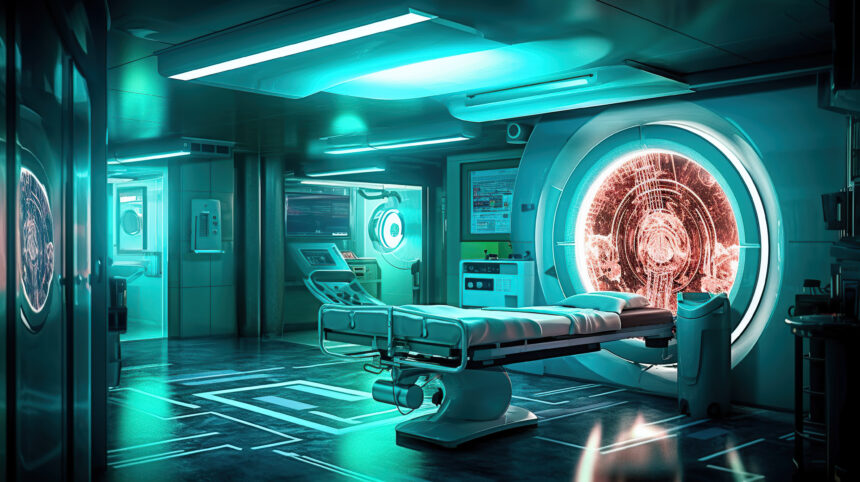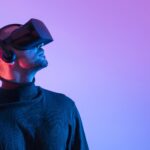Artificial Intelligence (AI) is transforming nearly every industry, and healthcare is no exception. From diagnosing diseases with greater accuracy to personalizing treatment plans and automating administrative tasks, AI is reshaping the way medical professionals deliver care. With the global AI in healthcare market expected to exceed $100 billion by 2030, it’s clear that this technology is not just a passing trend but a revolution that is here to stay.
In this article, we’ll explore how AI is revolutionizing diagnosis and treatment, its benefits, challenges, and what the future holds for AI-powered healthcare.
The Role of AI in Modern Healthcare
AI in healthcare refers to the use of machine learning, natural language processing (NLP), robotics, and predictive analytics to improve patient outcomes. The technology is being integrated into various areas, including:
- Medical Imaging and Diagnosis – AI analyzes X-rays, MRIs, and CT scans with higher precision than human radiologists.
- Personalized Treatment Plans – AI tailors treatment plans based on a patient’s medical history and genetic profile.
- Drug Discovery – AI accelerates drug development by predicting which compounds will be most effective.
- Predictive Analytics – AI identifies at-risk patients, enabling early intervention and preventive care.
- Administrative Automation – AI reduces paperwork and streamlines hospital operations, improving efficiency.
These advancements are making healthcare more efficient, cost-effective, and accessible for patients worldwide.
AI in Medical Diagnosis: Enhancing Accuracy and Speed
One of the biggest advantages of AI in healthcare is its ability to improve the accuracy and speed of medical diagnoses.
1. AI in Radiology
Medical imaging plays a critical role in diagnosing conditions like cancer, fractures, and neurological disorders. AI-powered algorithms can analyze scans faster and more accurately than human doctors. For example:
- Google’s DeepMind AI has demonstrated an ability to detect breast cancer with greater accuracy than radiologists.
- AI-powered tools like IBM Watson can analyze thousands of medical images in minutes, identifying abnormalities that doctors might miss.
2. AI in Pathology
Pathologists examine tissue samples to detect diseases like cancer. AI enhances this process by:
- Identifying cancer cells in biopsies with high precision.
- Reducing diagnostic errors and improving early detection rates.
3. AI in Early Disease Detection
AI can detect diseases before symptoms appear, allowing for earlier treatment.
- AI-powered wearables like Apple Watch and Fitbit can detect irregular heart rhythms, potentially preventing strokes.
- AI algorithms analyze genetic data to identify individuals at high risk for conditions like Alzheimer’s and diabetes.
These innovations enable doctors to intervene sooner, improving patient outcomes and survival rates.
AI in Treatment: Personalizing Healthcare Like Never Before
Beyond diagnosis, AI is also transforming treatment strategies by making them more personalized and effective.
1. AI-Powered Personalized Medicine
Traditional treatments often follow a one-size-fits-all approach, but AI enables precision medicine tailored to individual patients.
- AI analyzes a patient’s genetic makeup to determine the best drug or therapy for their condition.
- IBM Watson for Oncology helps doctors choose cancer treatments based on a patient’s medical history and latest research findings.
2. AI-Assisted Surgery
Robotic-assisted surgeries are becoming increasingly common, improving precision and reducing risks.
- Da Vinci Surgical System – Uses AI to assist surgeons in performing minimally invasive procedures with high precision.
- AI-Powered Robotics – Automate complex surgeries, reducing human error and improving recovery times.
3. AI in Drug Discovery
Developing new drugs is a time-consuming and costly process, but AI is accelerating it.
- AI algorithms predict how different compounds interact with the human body, reducing trial-and-error in drug testing.
- Companies like BenevolentAI and DeepMind’s AlphaFold are using AI to discover new drugs and understand protein structures faster.
These AI-driven breakthroughs have the potential to cure diseases that were previously considered untreatable.
AI in Predictive Healthcare: Preventing Diseases Before They Start
AI’s ability to analyze vast amounts of data makes it a powerful tool for predicting health risks and preventing diseases.
1. AI in Epidemic Prediction
AI played a crucial role in tracking the COVID-19 pandemic.
- Canadian AI company BlueDot detected the outbreak days before global health organizations issued warnings.
- AI models analyze social media, travel patterns, and medical reports to predict disease outbreaks in real time.
2. AI in Chronic Disease Management
AI helps manage chronic conditions like diabetes, heart disease, and asthma by:
- Analyzing patient data to detect early warning signs.
- Providing real-time health recommendations through mobile apps and wearables.
3. AI-Powered Virtual Health Assistants
AI chatbots and virtual assistants are making healthcare more accessible.
- Apps like Ada and Babylon Health use AI to assess symptoms and provide medical advice.
- AI chatbots reduce hospital visits by guiding patients to the right care.
By predicting health risks early, AI helps reduce hospitalizations and improve quality of life.
Challenges and Ethical Concerns of AI in Healthcare
Despite its potential, AI in healthcare comes with challenges:
1. Data Privacy and Security
AI relies on massive amounts of patient data, raising concerns about:
- How personal health information is stored and protected.
- Risks of data breaches and cyberattacks.
2. AI Bias and Accuracy Issues
AI models can inherit biases from the data they are trained on.
- If an AI is trained mostly on data from one demographic, it may not work well for others.
- There is a need for diverse and high-quality training data to ensure AI delivers fair and accurate results.
3. Regulatory and Legal Challenges
Governments and health organizations are still developing regulations for AI in healthcare.
- Who is responsible if an AI makes a wrong diagnosis?
- How should AI-generated treatment recommendations be monitored?
Addressing these challenges is crucial for AI to be widely accepted and trusted in healthcare.
The Future of AI in Healthcare: What’s Next?
AI in healthcare is still evolving, and its future looks promising. Key trends to watch include:
- AI-Powered Home Healthcare – Smart home devices will monitor vital signs and alert doctors if problems arise.
- AI and Mental Health – AI-driven therapy apps will provide mental health support and early intervention for depression and anxiety.
- AI in Genomics – AI will help decode human DNA, leading to breakthroughs in gene therapy and disease prevention.
- AI and Blockchain – Secure AI-driven healthcare records will improve data security and interoperability between hospitals.
AI is expected to play an even greater role in making healthcare more efficient, affordable, and accessible.
Final Thoughts
AI is revolutionizing healthcare by improving diagnosis, personalizing treatments, predicting diseases, and making surgeries more precise. While challenges remain, the benefits of AI in healthcare are undeniable. As technology advances, AI will continue to transform the medical industry, making high-quality healthcare available to more people than ever before.
For investors, tech companies, and healthcare professionals, now is the time to embrace AI-driven innovations. The future of medicine is intelligent, data-driven, and incredibly exciting.
FAQs
1. How is AI improving medical diagnosis?
AI analyzes medical images, genetic data, and patient records to detect diseases earlier and with greater accuracy than human doctors.
2. Can AI replace doctors?
AI can assist doctors by providing faster and more accurate diagnoses, but it cannot replace human expertise, empathy, and decision-making.
3. Is AI in healthcare safe?
AI is generally safe, but challenges like data privacy, bias, and regulatory issues need to be addressed for widespread adoption.
4. How does AI help in drug discovery?
AI predicts how different compounds interact with the human body, reducing the time and cost needed to develop new medications.
5. What is the biggest challenge for AI in healthcare?
The biggest challenges include ensuring data privacy, reducing biases in AI models, and creating regulations to govern AI-driven medical decisions.






